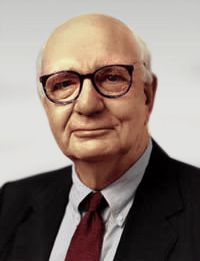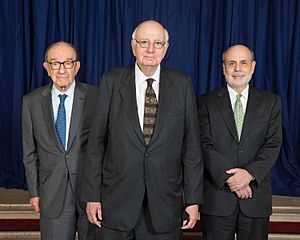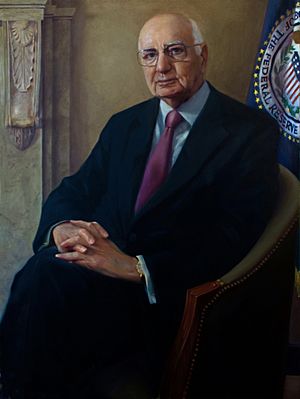Paul Volcker facts for kids
Quick facts for kids
Paul Volcker
|
|
|---|---|
 |
|
| Chair of the President's Economic Recovery Advisory Board | |
| In office February 6, 2009 – February 6, 2011 |
|
| President | Barack Obama |
| Preceded by | Position established |
| Succeeded by | Jeffrey R. Immelt (Council on Jobs and Competitiveness) |
| 12th Chairman of the Federal Reserve | |
| In office August 6, 1979 – August 11, 1987 |
|
| President | Jimmy Carter Ronald Reagan |
| Deputy | Frederick H. Schultz Preston Martin Manuel H. Johnson |
| Preceded by | G. William Miller |
| Succeeded by | Alan Greenspan |
| Member of the Federal Reserve Board of Governors | |
| In office August 6, 1979 – August 11, 1987 |
|
| President | Jimmy Carter Ronald Reagan |
| Preceded by | William Miller |
| Succeeded by | Alan Greenspan |
| President of the Federal Reserve Bank of New York | |
| In office May 2, 1975 – August 5, 1979 |
|
| Preceded by | Alfred Hayes |
| Succeeded by | Anthony M. Solomon |
| Personal details | |
| Born |
Paul Adolph Volcker Jr.
September 5, 1927 Cape May, New Jersey, U.S. |
| Died | December 8, 2019 (aged 92) New York City, U.S. |
| Political party | Democratic |
| Spouses |
Barbara Bahnson
(m. 1954; died 1998)Anke Dening
(m. 2010) |
| Children | 2 (with Bahnson) |
| Education | Princeton University (AB) Harvard University (AM) London School of Economics |
Paul Adolph Volcker Jr. (born September 5, 1927 – died December 8, 2019) was an important American economist. He is best known for being the 12th chairman of the Federal Reserve, which is like the central bank of the United States. He held this powerful job from 1979 to 1987.
During his time as chairman, Paul Volcker was praised for stopping the very high levels of inflation in the U.S. Inflation means that prices for goods and services go up, and your money buys less. Before this, he was the president of the Federal Reserve Bank of New York from 1975 to 1979.
President Jimmy Carter chose him to lead the Federal Reserve. Later, President Ronald Reagan asked him to stay for a second term. After leaving the Federal Reserve, he advised President Barack Obama during a tough economic time from 2009 to 2011.
Contents
Paul Volcker's Early Life and Education
Paul Volcker was born in Cape May, New Jersey. His parents were Alma Louise and Paul Adolph Volcker. His family had German roots. He grew up in Teaneck, New Jersey, where his father was the first city manager. His father helped make the town's economy stronger.
Paul Jr. had four older sisters. He went to a Lutheran church with his mother. He graduated from Teaneck High School in 1945. Even then, he impressed people with his knowledge of politics.
College and Graduate Studies
Volcker went to Princeton University for his undergraduate degree. He graduated with high honors in 1949. He then studied at Harvard University, earning a master's degree in political economy.
After Harvard, he studied at the London School of Economics from 1951 to 1952. He was there as a special scholar.
Paul Volcker's Career Journey
In 1952, Volcker started working as an economist at the Federal Reserve Bank of New York. He later worked at the Chase Manhattan Bank. In 1962, he joined the United States Department of the Treasury. He became a key person in financial analysis.
From 1969 to 1974, he served as the Under Secretary of the Treasury for international money matters. He played a big part in President Richard Nixon's decision in 1971 to stop linking the U.S. dollar to gold. This was a very important moment in his career. After this, he became the President of the Federal Reserve Bank of New York in 1975. He held this role until he became the Federal Reserve Chairman in 1979.
Leading the Federal Reserve
When Paul Volcker became chairman of the Board of Governors of the Federal Reserve System in August 1979, the U.S. faced a big problem: high inflation. Prices were rising very fast. President Jimmy Carter chose Volcker because he knew Volcker would tackle this issue.
Volcker's main goal was to bring inflation down. To do this, the Federal Reserve, under his leadership, made it more expensive to borrow money. They raised the federal funds rate, which is a key interest rate. This rate went from about 11% in 1979 to a high of 20% in 1981.
These high interest rates helped slow down the economy. This led to a recession (a period of economic slowdown) from 1980 to 1982. During this time, the number of people without jobs went up. Many people, especially farmers, were upset because it was hard to borrow money. There were even protests in Washington, D.C.
However, Volcker's actions worked. U.S. inflation, which was almost 15% in 1980, fell below 3% by 1983. This was a huge success in stabilizing the economy.
In 1986, Volcker also worked on the Plaza Accord. This was an agreement with Germany and Japan to help balance trade with the U.S.
After the Federal Reserve

After leaving the Federal Reserve in 1987, Volcker continued to be active in finance. He became chairman of a New York investment banking firm.
In 1996, he led a special committee called the Volcker Commission. This group investigated old bank accounts in Switzerland that belonged to Holocaust victims. He helped reach an agreement for a large settlement to help these victims.
In 2004, the United Nations asked Volcker to investigate possible corruption in the Iraqi Oil for Food program. His report pointed out problems in how the program was managed.
Advising President Obama
In 2008, Paul Volcker supported Barack Obama for president. When Obama became president, he asked Volcker to be an economic advisor. Volcker led the President's Economic Recovery Advisory Board from 2009 to 2011.
During this time, Volcker was very critical of banks. He believed they needed more rules to prevent another financial crisis. He suggested a new rule, which became known as the Volcker Rule. This rule aimed to stop banks that take deposits from regular people from making risky investments with their own money. President Obama officially proposed this rule in 2010.
Volcker was known for his simple views on banking. He once joked that the only truly useful banking invention was the ATM.
Other Important Work
Volcker was an honorary co-chairman for the World Justice Project. This group works to strengthen the idea of the rule of law around the world.
In 2013, he started the Volcker Alliance. This group is a non-profit organization that works to make public policies more effective. It also tries to rebuild trust in government.
He also served on the board of the Committee for a Responsible Federal Budget. This group teaches people about how government spending affects the country's money.
Paul Volcker's Personal Life
Paul Volcker married Barbara Bahnson in 1954. They had two children, Janice and James. James was born with cerebral palsy. They also had four grandchildren. Barbara passed away in 1998.
Volcker was very tall, standing at 6 feet 7 inches (2 meters). He was known as "Tall Paul." He also loved fly-fishing.
In 2010, he married Anke Dening, who had been his assistant for a long time.
Death
Paul Volcker died in New York City on December 8, 2019, at the age of 92. He had been treated for prostate cancer.
Honorary Degrees
Paul Volcker received many honorary degrees from universities. These included Princeton University, Harvard University, University of Notre Dame, and the London School of Economics.
Books by Paul Volcker
- Changing Fortunes, with Toyoo Gyohten, 1992
- Good Intentions Corrupted: The Oil for Food Scandal And the Threat to the U.N., with Jeffrey A. Meyer and Mark G. Califano, 2006
- Keeping at it: The Quest for Sound Money and Good Government (his memoir), 2018
Fun Fact
In 2015, a rock band from Portland, Oregon, named themselves "Volcker" after him! They even released an album.
See also
 In Spanish: Paul Volcker para niños
In Spanish: Paul Volcker para niños
 | Roy Wilkins |
 | John Lewis |
 | Linda Carol Brown |


